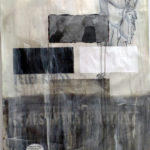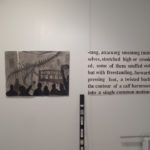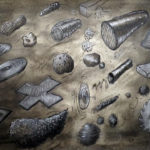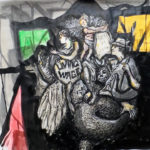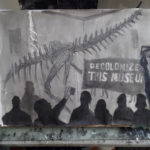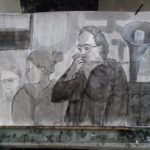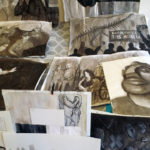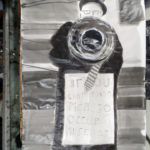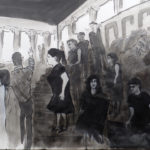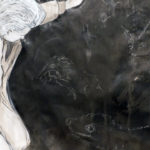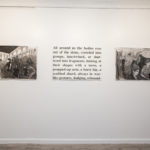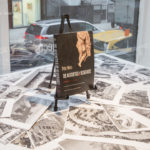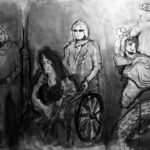Darker by Greg Sholette
Station Independent Gallery
Opens Saturday January 7th 2017 – 6pm
On view through January 29 2017
With a nod to Leonard Cohen’s final song, “You Want It Darker,” as well as to the sorrowful state of democracy in the US and the world, Sholette’s third solo exhibition at Station Independent Projects presents a series of ink, pencil and acrylic wash drawings portraying scenes of recent activist art and direct political resistance. “Darker” is based on photographs of activist art and other political protests. Some of the reference material was shot by Sholette using his flip-phone as he participated the art action. While working on the series over the past year the artists states that his approach to the drawings began to shift.
“I began to layer these images of resistance with darker, somber ink washes and marginalia that made reference to Goya’s private sketchbooks, as well as such things as graphic novels and the cult movie “Donnie Darko”. Perhaps it was the coming gloom generated by the November 8th elections that already began to intrude on my drawings?”
Nonetheless, the prime influence on Sholette’s Darker series is the epic three-volume novel “The Aesthetics of Resistance” by Peter Weiss, which pivots on organized working class resistance to Fascism in 1930s Germany. In the opening scene of Weiss’ book the author’s protagonist stands before the Pergamon Alter Frieze in Berlin and muses on its depiction of the ancient war between gods and Titans:
“All around us the bodies rose out of the stone, crowded into groups, intertwined, or shattered into fragments, hinting at their shapes with a torso, a propped-up arm, a burst hip, a scabbed shard, always in warlike gestures, dodging, rebounding, attacking shielding themselves, stretched high or crooked, some of them snuffed out, but with freestanding, forward-pressing foot, a twisted back, the contour of a calf harnessed into a single common motion”
With the Pergamon Frieze serving as Sholette’s leitmotif, Darker portrays public interventions, direct action and performances by such individuals and groups as Decolonize This Place, The Reverend Billy, Aaron Burr Society, Occupy Museums, Native American Water Protectors in North Dakota, and members of Global Ultra Luxury Faction (GULF) who are portrayed engaged in occupations of the Guggenheim Museums in New York and Venice to focus support on workers’ rights in Abu Dhabi where a new museum has been proposed despite intolerable labor conditions and human rights abuses in that nation. But the figures depicted in Sholette’s frieze are far more earthly and less perfect bodies and beings than gods and titans.
“Darker” offers tribute to this dissident agency without dismissing the frequently gloomy medium of historical circumstances in which we live, work, and make our art.
Artist Biography:
In his wide-ranging art, activist, and writing practice, Greg Sholette (American, b. 1956; lives in New York) has developed a self-described “viable, democratic, counter-narrative that, bit-by-bit, gains descriptive power within the larger public discourse.” Sholette is a founding member of Political Art Documentation/Distribution, which issued publications on politically engaged art in the 1980s; of REPOhistory, which repossessed suppressed histories in New York in the 1990s; and more recently, of Gulf Labor, a group of artists advocating for migrant workers constructing museums in Abu Dhabi. His recent art installations include Imaginary Archive at the Institute of Contemporary Art, University of Pennsylvania and the White Box at Zeppelin University, Germany and three solo exhibitions of his work at Station Independent Projects, NYC in 2016, 2014 and 2013, and his collaborative performance piece Precarious Workers Pageant premiered in Venice on August 7, 2015. In dozens of essays, three edited volumes, and his own books that include “Delirium & Resistance: Art Activism & the Crisis of Capitalism” (forthcoming Pluto Press, 2017 with a preface by Lucy R. Lippard), and “Dark Matter: Art and Politics in an Age of Enterprise Culture” (Pluto Press, 2011), Sholette has documented four decades of activist art that, for its ephemerality, politics, and market resistance, might otherwise remain invisible.
Station Independent Gallery Page

